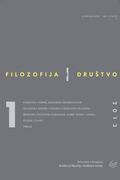Humanizam: zajednička tradicija islama i Evrope
Humanism: A Tradition Common to both Islam and Europe
Author(s): Hans DaiberSubject(s): Social Sciences
Published by: Institut za filozofiju i društvenu teoriju
Keywords: Humanism; Islamic and European; education; individuality; solidarity; free will and subordination; Ibn al-Muqaffaʿ; Fārābī; Yaḥyā IbnʿAdī; Miskawayh; Rāghib al-Iṣfahānī; Ghazzālī; Ibn Khaldūn; Renaissance of Islam – Italian Renaissance; Pico della Mirando
Summary/Abstract: The growing interest of the Arabs in Arabic translations from Greek since the 8th century has been interpreted as a sign ^of humanism in Islam. This is comparable to humanists in Europe who, since the 14th century, considered the Greek and Latin literature the foundation of spiritual and moral education. We will have to address the question of whether a similar ideal of education has been developed in harmony with religion in the Islamic cultural sphere. The perceived tension between the humanists of antiquity and Christianity has a parallel in the tensions between Islamic religiosity and a rational Islamic worldview. However, there are past and present approaches to developing an educational ideal, which is comparable to the European concept of a moral shaping of the individual. The Qur’ān and Islamic tradition do not impede the free development of personality and creative responsibility if their historicity is taken into account and if they are not elevated to an unref lected norm.
Journal: Filozofija i društvo
- Issue Year: 24/2013
- Issue No: 1
- Page Range: 293-310
- Page Count: 18
- Language: English

